Assignment 1: Management Accounting, Governance, and Skills Analysis
VerifiedAdded on 2022/02/14
|19
|4977
|220
Report
AI Summary
This report provides a comprehensive overview of internal accounting activities, encompassing definitions of accounting, management accounting, and financial accounting. It outlines the main objectives of both management and financial accounting, including cash flow management, cost control, tax planning, and policy development. The report further details the responsibilities of a management accountant within an organization, emphasizing planning, organizing, and controlling financial processes. It also explores financial governance, defining its importance to businesses and ethical considerations. Additionally, the report highlights the personal traits and skills essential for a management accountant's success. The document concludes by summarizing the key concepts and findings related to accounting activities and financial governance.
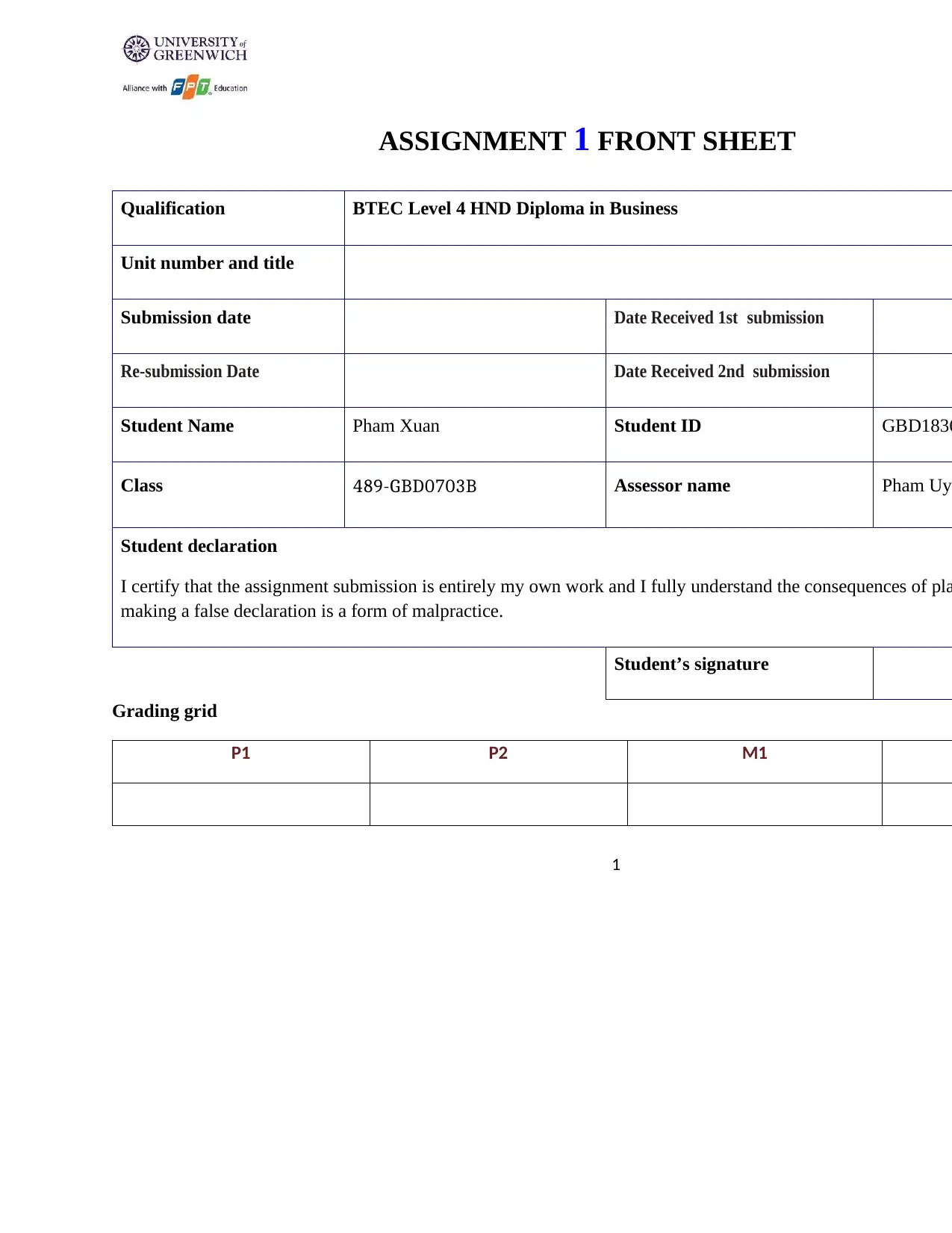
1
ASSIGNMENT 1 FRONT SHEET
Qualification BTEC Level 4 HND Diploma in Business
Unit number and title
Submission date Date Received 1st submission
Re-submission Date Date Received 2nd submission
Student Name Pham Xuan Student ID GBD1836
Class 489-GBD0703B Assessor name Pham Uye
Student declaration
I certify that the assignment submission is entirely my own work and I fully understand the consequences of pla
making a false declaration is a form of malpractice.
Student’s signature
Grading grid
P1 P2 M1
ASSIGNMENT 1 FRONT SHEET
Qualification BTEC Level 4 HND Diploma in Business
Unit number and title
Submission date Date Received 1st submission
Re-submission Date Date Received 2nd submission
Student Name Pham Xuan Student ID GBD1836
Class 489-GBD0703B Assessor name Pham Uye
Student declaration
I certify that the assignment submission is entirely my own work and I fully understand the consequences of pla
making a false declaration is a form of malpractice.
Student’s signature
Grading grid
P1 P2 M1
Paraphrase This Document
Need a fresh take? Get an instant paraphrase of this document with our AI Paraphraser
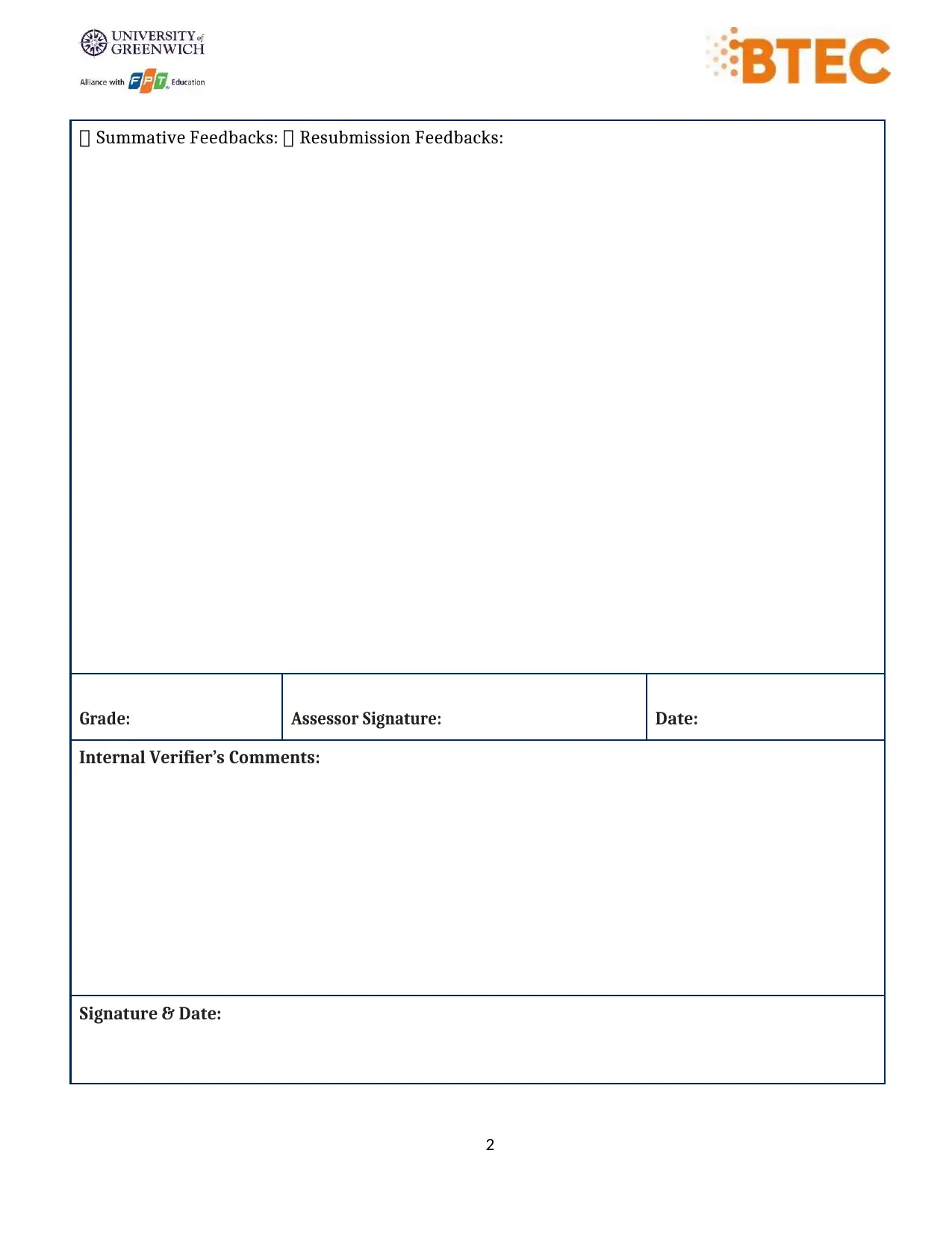
2
Summative Feedbacks: Resubmission Feedbacks:
Grade: Assessor Signature: Date:
Internal Verifier’s Comments:
Signature & Date:
Summative Feedbacks: Resubmission Feedbacks:
Grade: Assessor Signature: Date:
Internal Verifier’s Comments:
Signature & Date:
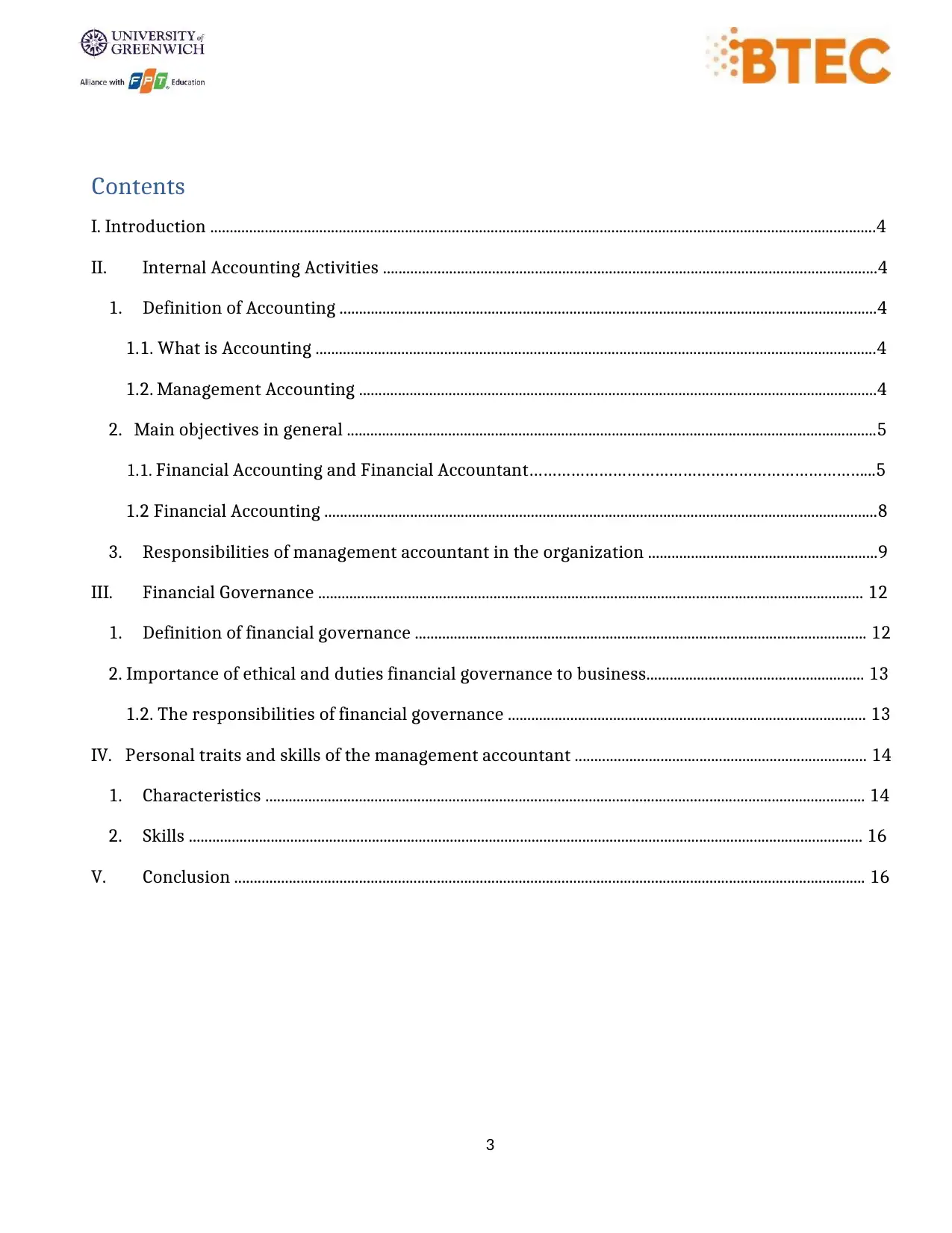
3
Contents
I. Introduction ...........................................................................................................................................................................4
II. Internal Accounting Activities ...............................................................................................................................4
1. Definition of Accounting ..........................................................................................................................................4
1.1. What is Accounting ................................................................................................................................................4
1.2. Management Accounting .....................................................................................................................................4
2. Main objectives in general ........................................................................................................................................5
1.1. Financial Accounting and Financial Accountant………………………………………………………………...5
1.2 Financial Accounting ..............................................................................................................................................8
3. Responsibilities of management accountant in the organization ...........................................................9
III. Financial Governance ............................................................................................................................................ 12
1. Definition of financial governance .................................................................................................................... 12
2. Importance of ethical and duties financial governance to business........................................................ 13
1.2. The responsibilities of financial governance ............................................................................................ 13
IV. Personal traits and skills of the management accountant ........................................................................... 14
1. Characteristics .......................................................................................................................................................... 14
2. Skills ............................................................................................................................................................................. 16
V. Conclusion .................................................................................................................................................................. 16
Contents
I. Introduction ...........................................................................................................................................................................4
II. Internal Accounting Activities ...............................................................................................................................4
1. Definition of Accounting ..........................................................................................................................................4
1.1. What is Accounting ................................................................................................................................................4
1.2. Management Accounting .....................................................................................................................................4
2. Main objectives in general ........................................................................................................................................5
1.1. Financial Accounting and Financial Accountant………………………………………………………………...5
1.2 Financial Accounting ..............................................................................................................................................8
3. Responsibilities of management accountant in the organization ...........................................................9
III. Financial Governance ............................................................................................................................................ 12
1. Definition of financial governance .................................................................................................................... 12
2. Importance of ethical and duties financial governance to business........................................................ 13
1.2. The responsibilities of financial governance ............................................................................................ 13
IV. Personal traits and skills of the management accountant ........................................................................... 14
1. Characteristics .......................................................................................................................................................... 14
2. Skills ............................................................................................................................................................................. 16
V. Conclusion .................................................................................................................................................................. 16
⊘ This is a preview!⊘
Do you want full access?
Subscribe today to unlock all pages.

Trusted by 1+ million students worldwide
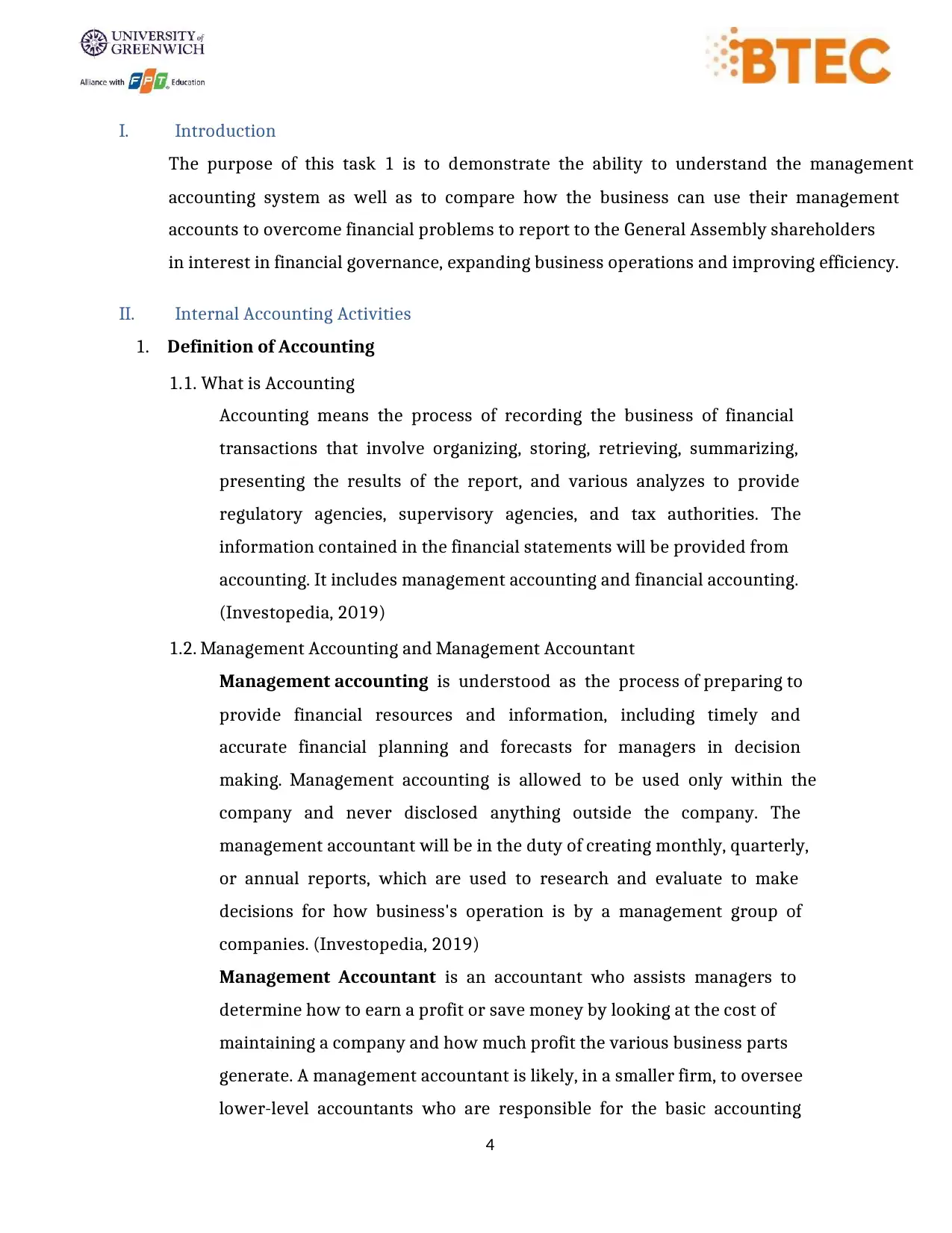
4
I. Introduction
The purpose of this task 1 is to demonstrate the ability to understand the management
accounting system as well as to compare how the business can use their management
accounts to overcome financial problems to report to the General Assembly shareholders
in interest in financial governance, expanding business operations and improving efficiency.
II. Internal Accounting Activities
1. Definition of Accounting
1.1. What is Accounting
Accounting means the process of recording the business of financial
transactions that involve organizing, storing, retrieving, summarizing,
presenting the results of the report, and various analyzes to provide
regulatory agencies, supervisory agencies, and tax authorities. The
information contained in the financial statements will be provided from
accounting. It includes management accounting and financial accounting.
(Investopedia, 2019)
1.2. Management Accounting and Management Accountant
Management accounting is understood as the process of preparing to
provide financial resources and information, including timely and
accurate financial planning and forecasts for managers in decision
making. Management accounting is allowed to be used only within the
company and never disclosed anything outside the company. The
management accountant will be in the duty of creating monthly, quarterly,
or annual reports, which are used to research and evaluate to make
decisions for how business's operation is by a management group of
companies. (Investopedia, 2019)
Management Accountant is an accountant who assists managers to
determine how to earn a profit or save money by looking at the cost of
maintaining a company and how much profit the various business parts
generate. A management accountant is likely, in a smaller firm, to oversee
lower-level accountants who are responsible for the basic accounting
I. Introduction
The purpose of this task 1 is to demonstrate the ability to understand the management
accounting system as well as to compare how the business can use their management
accounts to overcome financial problems to report to the General Assembly shareholders
in interest in financial governance, expanding business operations and improving efficiency.
II. Internal Accounting Activities
1. Definition of Accounting
1.1. What is Accounting
Accounting means the process of recording the business of financial
transactions that involve organizing, storing, retrieving, summarizing,
presenting the results of the report, and various analyzes to provide
regulatory agencies, supervisory agencies, and tax authorities. The
information contained in the financial statements will be provided from
accounting. It includes management accounting and financial accounting.
(Investopedia, 2019)
1.2. Management Accounting and Management Accountant
Management accounting is understood as the process of preparing to
provide financial resources and information, including timely and
accurate financial planning and forecasts for managers in decision
making. Management accounting is allowed to be used only within the
company and never disclosed anything outside the company. The
management accountant will be in the duty of creating monthly, quarterly,
or annual reports, which are used to research and evaluate to make
decisions for how business's operation is by a management group of
companies. (Investopedia, 2019)
Management Accountant is an accountant who assists managers to
determine how to earn a profit or save money by looking at the cost of
maintaining a company and how much profit the various business parts
generate. A management accountant is likely, in a smaller firm, to oversee
lower-level accountants who are responsible for the basic accounting
Paraphrase This Document
Need a fresh take? Get an instant paraphrase of this document with our AI Paraphraser
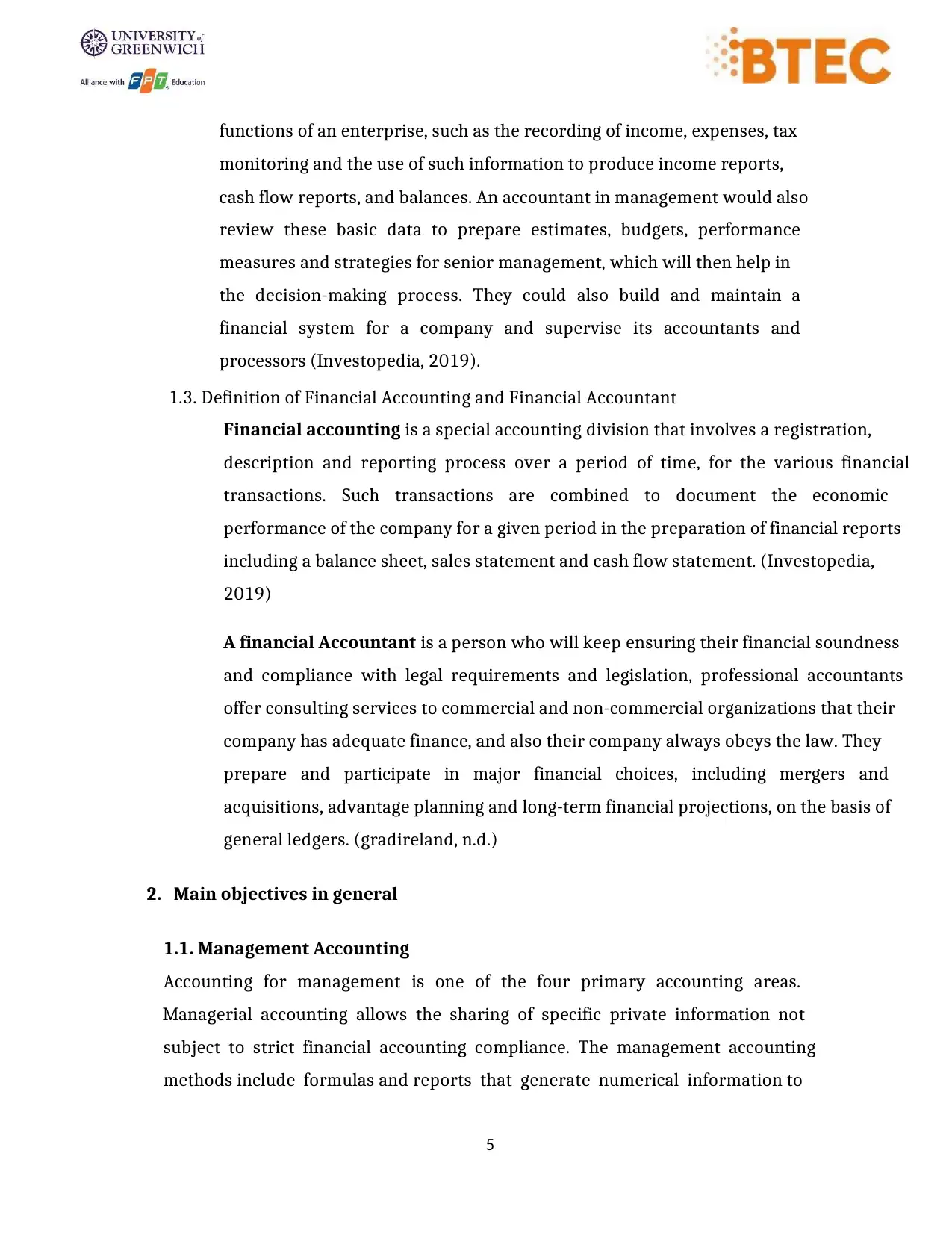
5
functions of an enterprise, such as the recording of income, expenses, tax
monitoring and the use of such information to produce income reports,
cash flow reports, and balances. An accountant in management would also
review these basic data to prepare estimates, budgets, performance
measures and strategies for senior management, which will then help in
the decision-making process. They could also build and maintain a
financial system for a company and supervise its accountants and
processors (Investopedia, 2019).
1.3. Definition of Financial Accounting and Financial Accountant
Financial accounting is a special accounting division that involves a registration,
description and reporting process over a period of time, for the various financial
transactions. Such transactions are combined to document the economic
performance of the company for a given period in the preparation of financial reports
including a balance sheet, sales statement and cash flow statement. (Investopedia,
2019)
A financial Accountant is a person who will keep ensuring their financial soundness
and compliance with legal requirements and legislation, professional accountants
offer consulting services to commercial and non-commercial organizations that their
company has adequate finance, and also their company always obeys the law. They
prepare and participate in major financial choices, including mergers and
acquisitions, advantage planning and long-term financial projections, on the basis of
general ledgers. (gradireland, n.d.)
2. Main objectives in general
1.1. Management Accounting
Accounting for management is one of the four primary accounting areas.
Managerial accounting allows the sharing of specific private information not
subject to strict financial accounting compliance. The management accounting
methods include formulas and reports that generate numerical information to
functions of an enterprise, such as the recording of income, expenses, tax
monitoring and the use of such information to produce income reports,
cash flow reports, and balances. An accountant in management would also
review these basic data to prepare estimates, budgets, performance
measures and strategies for senior management, which will then help in
the decision-making process. They could also build and maintain a
financial system for a company and supervise its accountants and
processors (Investopedia, 2019).
1.3. Definition of Financial Accounting and Financial Accountant
Financial accounting is a special accounting division that involves a registration,
description and reporting process over a period of time, for the various financial
transactions. Such transactions are combined to document the economic
performance of the company for a given period in the preparation of financial reports
including a balance sheet, sales statement and cash flow statement. (Investopedia,
2019)
A financial Accountant is a person who will keep ensuring their financial soundness
and compliance with legal requirements and legislation, professional accountants
offer consulting services to commercial and non-commercial organizations that their
company has adequate finance, and also their company always obeys the law. They
prepare and participate in major financial choices, including mergers and
acquisitions, advantage planning and long-term financial projections, on the basis of
general ledgers. (gradireland, n.d.)
2. Main objectives in general
1.1. Management Accounting
Accounting for management is one of the four primary accounting areas.
Managerial accounting allows the sharing of specific private information not
subject to strict financial accounting compliance. The management accounting
methods include formulas and reports that generate numerical information to
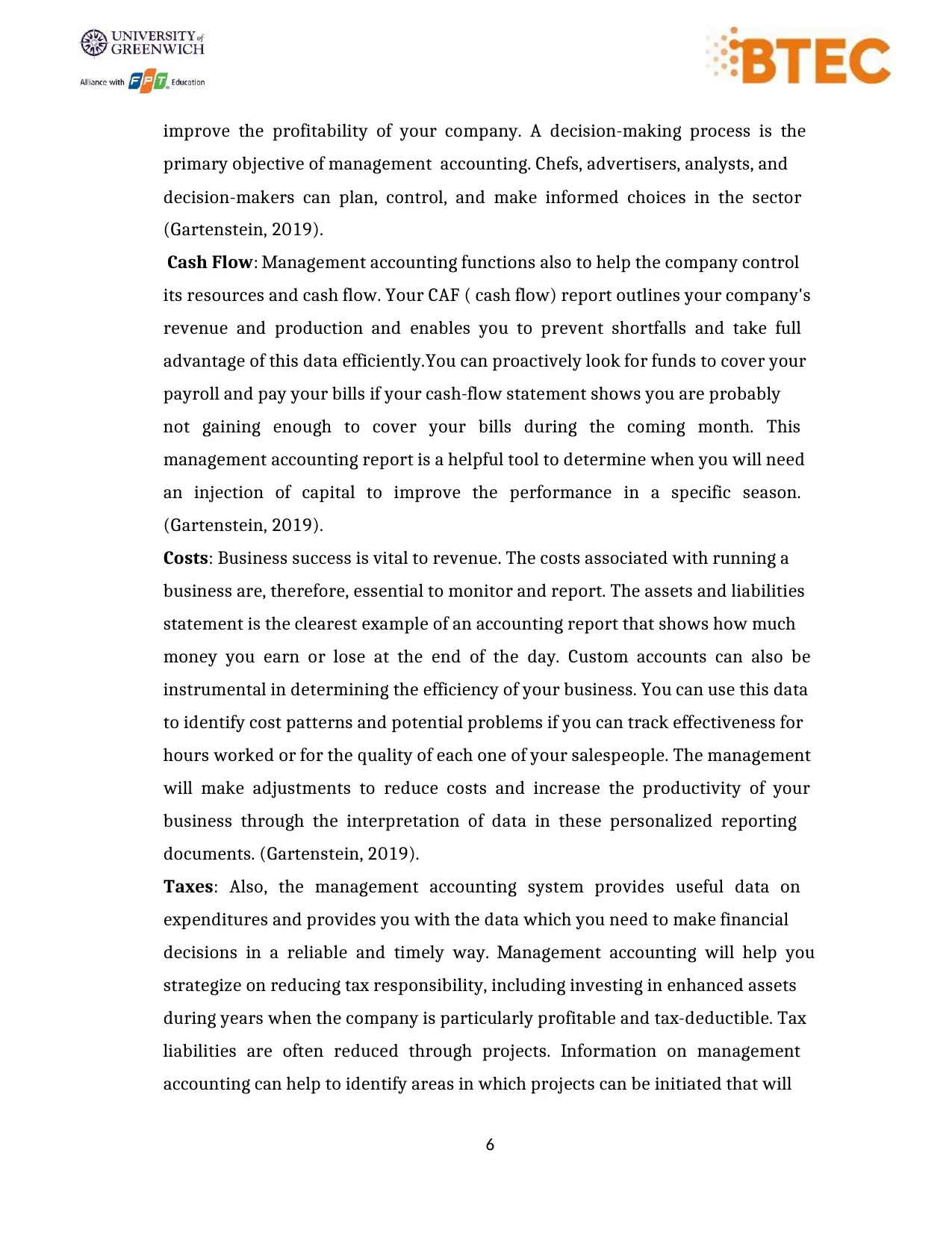
6
improve the profitability of your company. A decision-making process is the
primary objective of management accounting. Chefs, advertisers, analysts, and
decision-makers can plan, control, and make informed choices in the sector
(Gartenstein, 2019).
Cash Flow: Management accounting functions also to help the company control
its resources and cash flow. Your CAF ( cash flow) report outlines your company's
revenue and production and enables you to prevent shortfalls and take full
advantage of this data efficiently.You can proactively look for funds to cover your
payroll and pay your bills if your cash-flow statement shows you are probably
not gaining enough to cover your bills during the coming month. This
management accounting report is a helpful tool to determine when you will need
an injection of capital to improve the performance in a specific season.
(Gartenstein, 2019).
Costs: Business success is vital to revenue. The costs associated with running a
business are, therefore, essential to monitor and report. The assets and liabilities
statement is the clearest example of an accounting report that shows how much
money you earn or lose at the end of the day. Custom accounts can also be
instrumental in determining the efficiency of your business. You can use this data
to identify cost patterns and potential problems if you can track effectiveness for
hours worked or for the quality of each one of your salespeople. The management
will make adjustments to reduce costs and increase the productivity of your
business through the interpretation of data in these personalized reporting
documents. (Gartenstein, 2019).
Taxes: Also, the management accounting system provides useful data on
expenditures and provides you with the data which you need to make financial
decisions in a reliable and timely way. Management accounting will help you
strategize on reducing tax responsibility, including investing in enhanced assets
during years when the company is particularly profitable and tax-deductible. Tax
liabilities are often reduced through projects. Information on management
accounting can help to identify areas in which projects can be initiated that will
improve the profitability of your company. A decision-making process is the
primary objective of management accounting. Chefs, advertisers, analysts, and
decision-makers can plan, control, and make informed choices in the sector
(Gartenstein, 2019).
Cash Flow: Management accounting functions also to help the company control
its resources and cash flow. Your CAF ( cash flow) report outlines your company's
revenue and production and enables you to prevent shortfalls and take full
advantage of this data efficiently.You can proactively look for funds to cover your
payroll and pay your bills if your cash-flow statement shows you are probably
not gaining enough to cover your bills during the coming month. This
management accounting report is a helpful tool to determine when you will need
an injection of capital to improve the performance in a specific season.
(Gartenstein, 2019).
Costs: Business success is vital to revenue. The costs associated with running a
business are, therefore, essential to monitor and report. The assets and liabilities
statement is the clearest example of an accounting report that shows how much
money you earn or lose at the end of the day. Custom accounts can also be
instrumental in determining the efficiency of your business. You can use this data
to identify cost patterns and potential problems if you can track effectiveness for
hours worked or for the quality of each one of your salespeople. The management
will make adjustments to reduce costs and increase the productivity of your
business through the interpretation of data in these personalized reporting
documents. (Gartenstein, 2019).
Taxes: Also, the management accounting system provides useful data on
expenditures and provides you with the data which you need to make financial
decisions in a reliable and timely way. Management accounting will help you
strategize on reducing tax responsibility, including investing in enhanced assets
during years when the company is particularly profitable and tax-deductible. Tax
liabilities are often reduced through projects. Information on management
accounting can help to identify areas in which projects can be initiated that will
⊘ This is a preview!⊘
Do you want full access?
Subscribe today to unlock all pages.

Trusted by 1+ million students worldwide
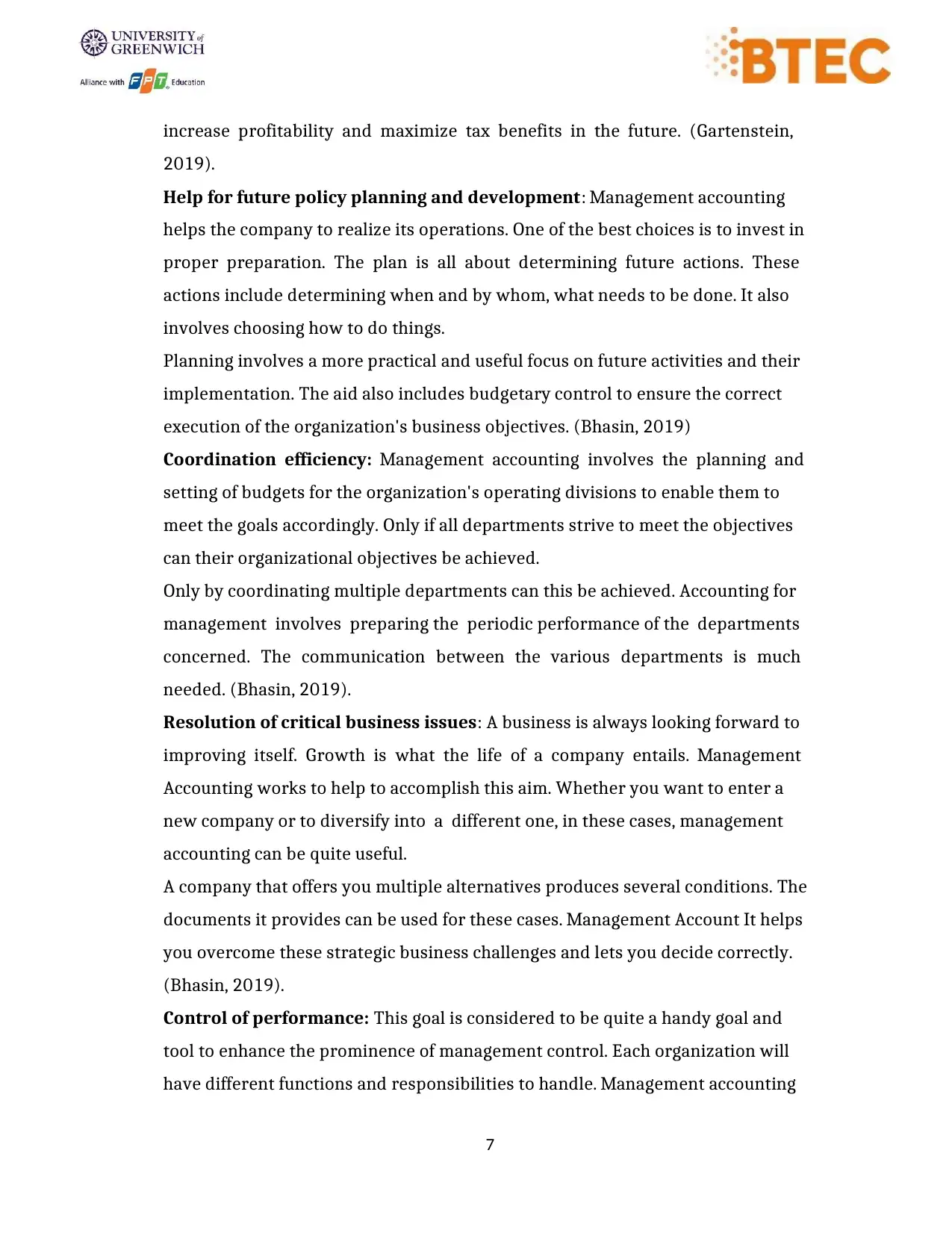
7
increase profitability and maximize tax benefits in the future. (Gartenstein,
2019).
Help for future policy planning and development: Management accounting
helps the company to realize its operations. One of the best choices is to invest in
proper preparation. The plan is all about determining future actions. These
actions include determining when and by whom, what needs to be done. It also
involves choosing how to do things.
Planning involves a more practical and useful focus on future activities and their
implementation. The aid also includes budgetary control to ensure the correct
execution of the organization's business objectives. (Bhasin, 2019)
Coordination efficiency: Management accounting involves the planning and
setting of budgets for the organization's operating divisions to enable them to
meet the goals accordingly. Only if all departments strive to meet the objectives
can their organizational objectives be achieved.
Only by coordinating multiple departments can this be achieved. Accounting for
management involves preparing the periodic performance of the departments
concerned. The communication between the various departments is much
needed. (Bhasin, 2019).
Resolution of critical business issues: A business is always looking forward to
improving itself. Growth is what the life of a company entails. Management
Accounting works to help to accomplish this aim. Whether you want to enter a
new company or to diversify into a different one, in these cases, management
accounting can be quite useful.
A company that offers you multiple alternatives produces several conditions. The
documents it provides can be used for these cases. Management Account It helps
you overcome these strategic business challenges and lets you decide correctly.
(Bhasin, 2019).
Control of performance: This goal is considered to be quite a handy goal and
tool to enhance the prominence of management control. Each organization will
have different functions and responsibilities to handle. Management accounting
increase profitability and maximize tax benefits in the future. (Gartenstein,
2019).
Help for future policy planning and development: Management accounting
helps the company to realize its operations. One of the best choices is to invest in
proper preparation. The plan is all about determining future actions. These
actions include determining when and by whom, what needs to be done. It also
involves choosing how to do things.
Planning involves a more practical and useful focus on future activities and their
implementation. The aid also includes budgetary control to ensure the correct
execution of the organization's business objectives. (Bhasin, 2019)
Coordination efficiency: Management accounting involves the planning and
setting of budgets for the organization's operating divisions to enable them to
meet the goals accordingly. Only if all departments strive to meet the objectives
can their organizational objectives be achieved.
Only by coordinating multiple departments can this be achieved. Accounting for
management involves preparing the periodic performance of the departments
concerned. The communication between the various departments is much
needed. (Bhasin, 2019).
Resolution of critical business issues: A business is always looking forward to
improving itself. Growth is what the life of a company entails. Management
Accounting works to help to accomplish this aim. Whether you want to enter a
new company or to diversify into a different one, in these cases, management
accounting can be quite useful.
A company that offers you multiple alternatives produces several conditions. The
documents it provides can be used for these cases. Management Account It helps
you overcome these strategic business challenges and lets you decide correctly.
(Bhasin, 2019).
Control of performance: This goal is considered to be quite a handy goal and
tool to enhance the prominence of management control. Each organization will
have different functions and responsibilities to handle. Management accounting
Paraphrase This Document
Need a fresh take? Get an instant paraphrase of this document with our AI Paraphraser
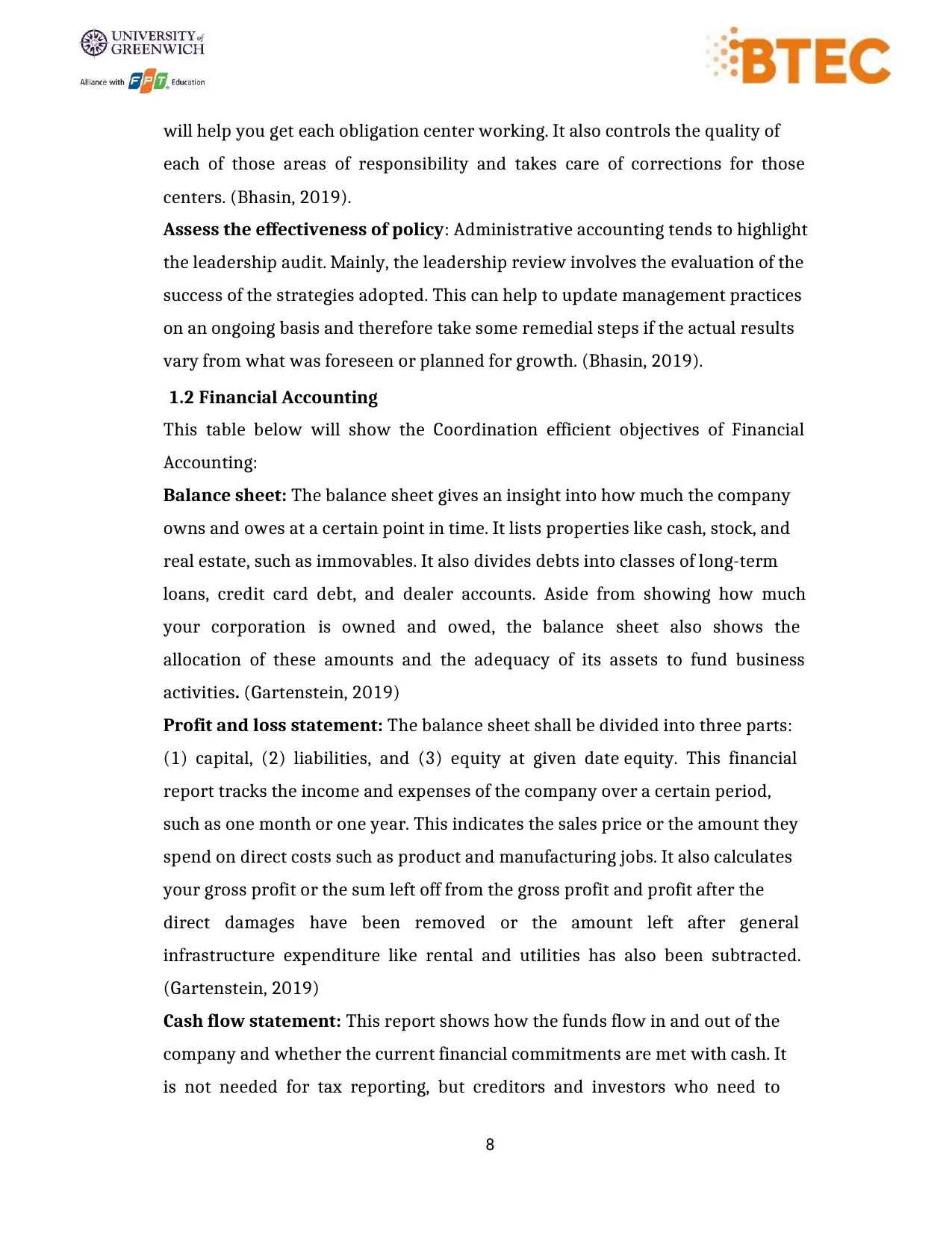
8
will help you get each obligation center working. It also controls the quality of
each of those areas of responsibility and takes care of corrections for those
centers. (Bhasin, 2019).
Assess the effectiveness of policy: Administrative accounting tends to highlight
the leadership audit. Mainly, the leadership review involves the evaluation of the
success of the strategies adopted. This can help to update management practices
on an ongoing basis and therefore take some remedial steps if the actual results
vary from what was foreseen or planned for growth. (Bhasin, 2019).
1.2 Financial Accounting
This table below will show the Coordination efficient objectives of Financial
Accounting:
Balance sheet: The balance sheet gives an insight into how much the company
owns and owes at a certain point in time. It lists properties like cash, stock, and
real estate, such as immovables. It also divides debts into classes of long-term
loans, credit card debt, and dealer accounts. Aside from showing how much
your corporation is owned and owed, the balance sheet also shows the
allocation of these amounts and the adequacy of its assets to fund business
activities. (Gartenstein, 2019)
Profit and loss statement: The balance sheet shall be divided into three parts:
(1) capital, (2) liabilities, and (3) equity at given date equity. This financial
report tracks the income and expenses of the company over a certain period,
such as one month or one year. This indicates the sales price or the amount they
spend on direct costs such as product and manufacturing jobs. It also calculates
your gross profit or the sum left off from the gross profit and profit after the
direct damages have been removed or the amount left after general
infrastructure expenditure like rental and utilities has also been subtracted.
(Gartenstein, 2019)
Cash flow statement: This report shows how the funds flow in and out of the
company and whether the current financial commitments are met with cash. It
is not needed for tax reporting, but creditors and investors who need to
will help you get each obligation center working. It also controls the quality of
each of those areas of responsibility and takes care of corrections for those
centers. (Bhasin, 2019).
Assess the effectiveness of policy: Administrative accounting tends to highlight
the leadership audit. Mainly, the leadership review involves the evaluation of the
success of the strategies adopted. This can help to update management practices
on an ongoing basis and therefore take some remedial steps if the actual results
vary from what was foreseen or planned for growth. (Bhasin, 2019).
1.2 Financial Accounting
This table below will show the Coordination efficient objectives of Financial
Accounting:
Balance sheet: The balance sheet gives an insight into how much the company
owns and owes at a certain point in time. It lists properties like cash, stock, and
real estate, such as immovables. It also divides debts into classes of long-term
loans, credit card debt, and dealer accounts. Aside from showing how much
your corporation is owned and owed, the balance sheet also shows the
allocation of these amounts and the adequacy of its assets to fund business
activities. (Gartenstein, 2019)
Profit and loss statement: The balance sheet shall be divided into three parts:
(1) capital, (2) liabilities, and (3) equity at given date equity. This financial
report tracks the income and expenses of the company over a certain period,
such as one month or one year. This indicates the sales price or the amount they
spend on direct costs such as product and manufacturing jobs. It also calculates
your gross profit or the sum left off from the gross profit and profit after the
direct damages have been removed or the amount left after general
infrastructure expenditure like rental and utilities has also been subtracted.
(Gartenstein, 2019)
Cash flow statement: This report shows how the funds flow in and out of the
company and whether the current financial commitments are met with cash. It
is not needed for tax reporting, but creditors and investors who need to
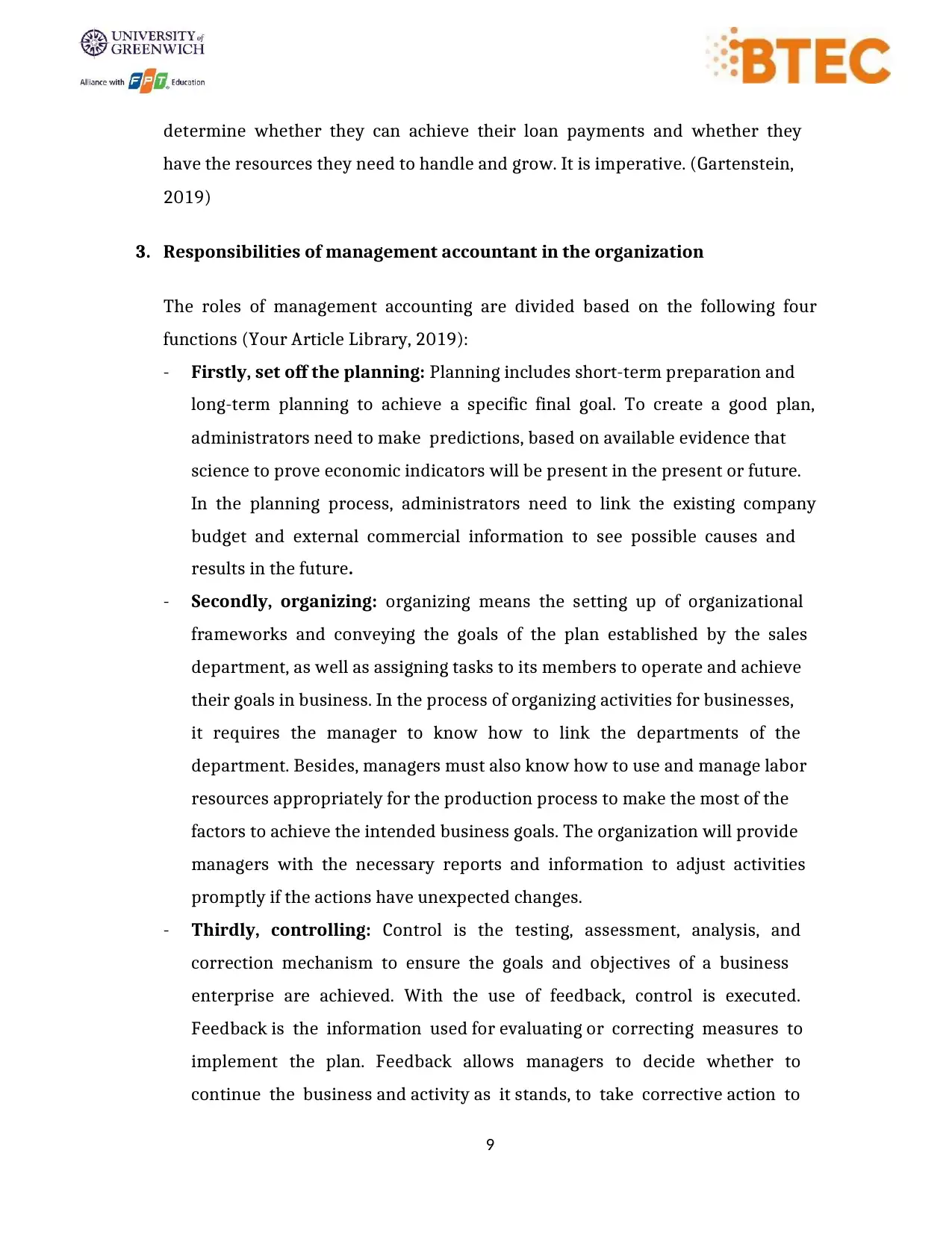
9
determine whether they can achieve their loan payments and whether they
have the resources they need to handle and grow. It is imperative. (Gartenstein,
2019)
3. Responsibilities of management accountant in the organization
The roles of management accounting are divided based on the following four
functions (Your Article Library, 2019):
- Firstly, set off the planning: Planning includes short-term preparation and
long-term planning to achieve a specific final goal. To create a good plan,
administrators need to make predictions, based on available evidence that
science to prove economic indicators will be present in the present or future.
In the planning process, administrators need to link the existing company
budget and external commercial information to see possible causes and
results in the future.
- Secondly, organizing: organizing means the setting up of organizational
frameworks and conveying the goals of the plan established by the sales
department, as well as assigning tasks to its members to operate and achieve
their goals in business. In the process of organizing activities for businesses,
it requires the manager to know how to link the departments of the
department. Besides, managers must also know how to use and manage labor
resources appropriately for the production process to make the most of the
factors to achieve the intended business goals. The organization will provide
managers with the necessary reports and information to adjust activities
promptly if the actions have unexpected changes.
- Thirdly, controlling: Control is the testing, assessment, analysis, and
correction mechanism to ensure the goals and objectives of a business
enterprise are achieved. With the use of feedback, control is executed.
Feedback is the information used for evaluating or correcting measures to
implement the plan. Feedback allows managers to decide whether to
continue the business and activity as it stands, to take corrective action to
determine whether they can achieve their loan payments and whether they
have the resources they need to handle and grow. It is imperative. (Gartenstein,
2019)
3. Responsibilities of management accountant in the organization
The roles of management accounting are divided based on the following four
functions (Your Article Library, 2019):
- Firstly, set off the planning: Planning includes short-term preparation and
long-term planning to achieve a specific final goal. To create a good plan,
administrators need to make predictions, based on available evidence that
science to prove economic indicators will be present in the present or future.
In the planning process, administrators need to link the existing company
budget and external commercial information to see possible causes and
results in the future.
- Secondly, organizing: organizing means the setting up of organizational
frameworks and conveying the goals of the plan established by the sales
department, as well as assigning tasks to its members to operate and achieve
their goals in business. In the process of organizing activities for businesses,
it requires the manager to know how to link the departments of the
department. Besides, managers must also know how to use and manage labor
resources appropriately for the production process to make the most of the
factors to achieve the intended business goals. The organization will provide
managers with the necessary reports and information to adjust activities
promptly if the actions have unexpected changes.
- Thirdly, controlling: Control is the testing, assessment, analysis, and
correction mechanism to ensure the goals and objectives of a business
enterprise are achieved. With the use of feedback, control is executed.
Feedback is the information used for evaluating or correcting measures to
implement the plan. Feedback allows managers to decide whether to
continue the business and activity as it stands, to take corrective action to
⊘ This is a preview!⊘
Do you want full access?
Subscribe today to unlock all pages.

Trusted by 1+ million students worldwide
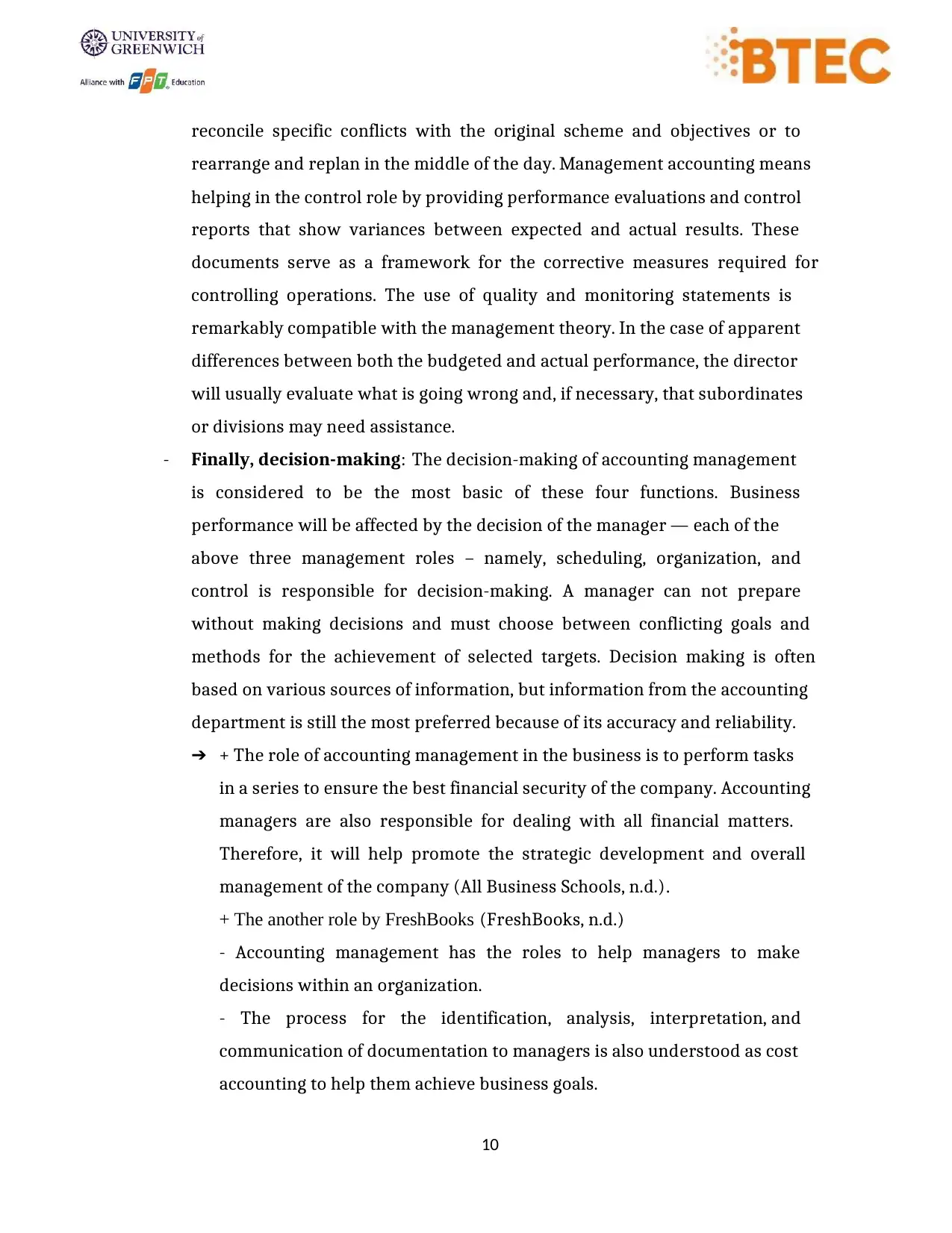
10
reconcile specific conflicts with the original scheme and objectives or to
rearrange and replan in the middle of the day. Management accounting means
helping in the control role by providing performance evaluations and control
reports that show variances between expected and actual results. These
documents serve as a framework for the corrective measures required for
controlling operations. The use of quality and monitoring statements is
remarkably compatible with the management theory. In the case of apparent
differences between both the budgeted and actual performance, the director
will usually evaluate what is going wrong and, if necessary, that subordinates
or divisions may need assistance.
- Finally, decision-making: The decision-making of accounting management
is considered to be the most basic of these four functions. Business
performance will be affected by the decision of the manager — each of the
above three management roles – namely, scheduling, organization, and
control is responsible for decision-making. A manager can not prepare
without making decisions and must choose between conflicting goals and
methods for the achievement of selected targets. Decision making is often
based on various sources of information, but information from the accounting
department is still the most preferred because of its accuracy and reliability.
➔ + The role of accounting management in the business is to perform tasks
in a series to ensure the best financial security of the company. Accounting
managers are also responsible for dealing with all financial matters.
Therefore, it will help promote the strategic development and overall
management of the company (All Business Schools, n.d.).
+ The another role by FreshBooks (FreshBooks, n.d.)
- Accounting management has the roles to help managers to make
decisions within an organization.
- The process for the identification, analysis, interpretation, and
communication of documentation to managers is also understood as cost
accounting to help them achieve business goals.
reconcile specific conflicts with the original scheme and objectives or to
rearrange and replan in the middle of the day. Management accounting means
helping in the control role by providing performance evaluations and control
reports that show variances between expected and actual results. These
documents serve as a framework for the corrective measures required for
controlling operations. The use of quality and monitoring statements is
remarkably compatible with the management theory. In the case of apparent
differences between both the budgeted and actual performance, the director
will usually evaluate what is going wrong and, if necessary, that subordinates
or divisions may need assistance.
- Finally, decision-making: The decision-making of accounting management
is considered to be the most basic of these four functions. Business
performance will be affected by the decision of the manager — each of the
above three management roles – namely, scheduling, organization, and
control is responsible for decision-making. A manager can not prepare
without making decisions and must choose between conflicting goals and
methods for the achievement of selected targets. Decision making is often
based on various sources of information, but information from the accounting
department is still the most preferred because of its accuracy and reliability.
➔ + The role of accounting management in the business is to perform tasks
in a series to ensure the best financial security of the company. Accounting
managers are also responsible for dealing with all financial matters.
Therefore, it will help promote the strategic development and overall
management of the company (All Business Schools, n.d.).
+ The another role by FreshBooks (FreshBooks, n.d.)
- Accounting management has the roles to help managers to make
decisions within an organization.
- The process for the identification, analysis, interpretation, and
communication of documentation to managers is also understood as cost
accounting to help them achieve business goals.
Paraphrase This Document
Need a fresh take? Get an instant paraphrase of this document with our AI Paraphraser
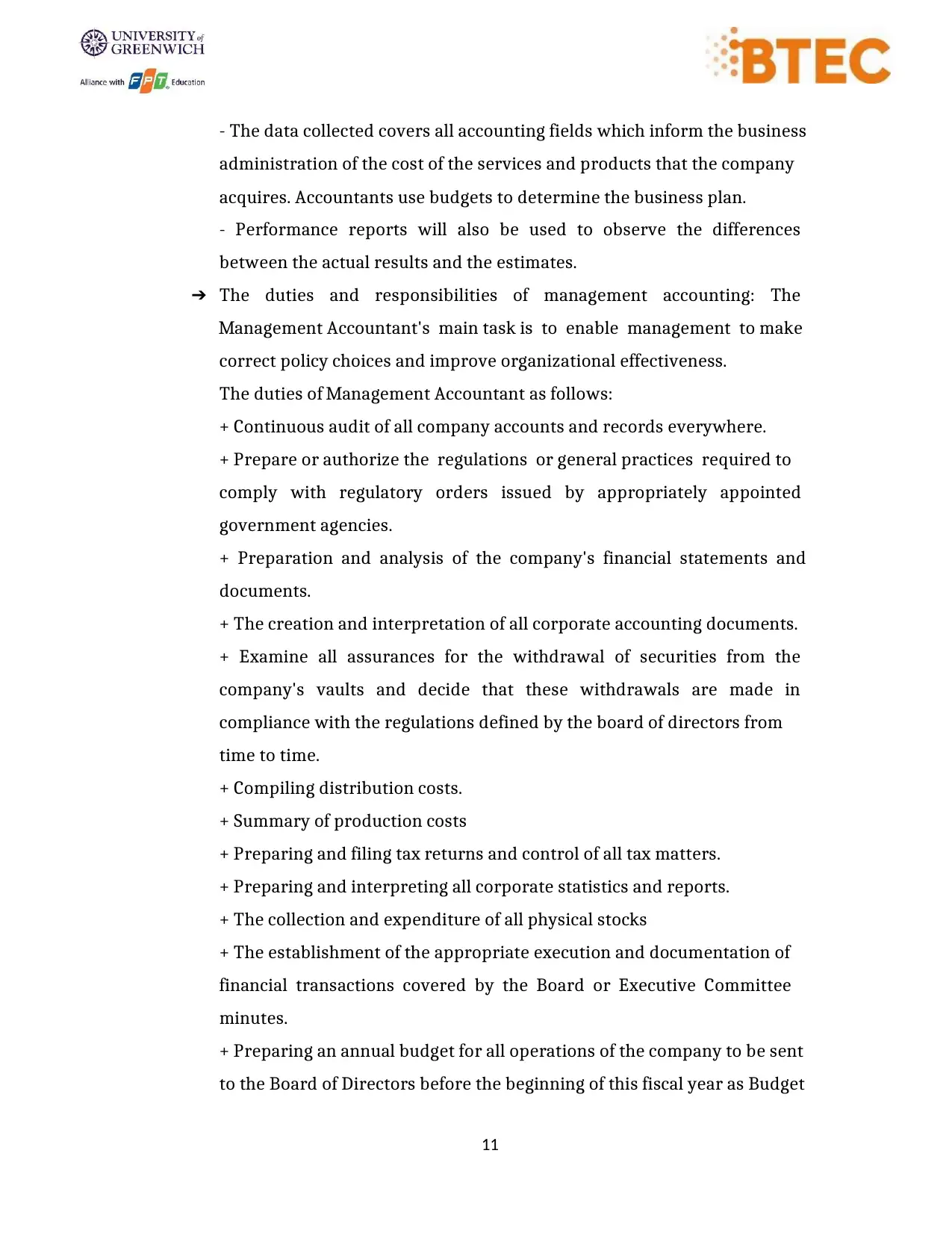
11
- The data collected covers all accounting fields which inform the business
administration of the cost of the services and products that the company
acquires. Accountants use budgets to determine the business plan.
- Performance reports will also be used to observe the differences
between the actual results and the estimates.
➔ The duties and responsibilities of management accounting: The
Management Accountant's main task is to enable management to make
correct policy choices and improve organizational effectiveness.
The duties of Management Accountant as follows:
+ Continuous audit of all company accounts and records everywhere.
+ Prepare or authorize the regulations or general practices required to
comply with regulatory orders issued by appropriately appointed
government agencies.
+ Preparation and analysis of the company's financial statements and
documents.
+ The creation and interpretation of all corporate accounting documents.
+ Examine all assurances for the withdrawal of securities from the
company's vaults and decide that these withdrawals are made in
compliance with the regulations defined by the board of directors from
time to time.
+ Compiling distribution costs.
+ Summary of production costs
+ Preparing and filing tax returns and control of all tax matters.
+ Preparing and interpreting all corporate statistics and reports.
+ The collection and expenditure of all physical stocks
+ The establishment of the appropriate execution and documentation of
financial transactions covered by the Board or Executive Committee
minutes.
+ Preparing an annual budget for all operations of the company to be sent
to the Board of Directors before the beginning of this fiscal year as Budget
- The data collected covers all accounting fields which inform the business
administration of the cost of the services and products that the company
acquires. Accountants use budgets to determine the business plan.
- Performance reports will also be used to observe the differences
between the actual results and the estimates.
➔ The duties and responsibilities of management accounting: The
Management Accountant's main task is to enable management to make
correct policy choices and improve organizational effectiveness.
The duties of Management Accountant as follows:
+ Continuous audit of all company accounts and records everywhere.
+ Prepare or authorize the regulations or general practices required to
comply with regulatory orders issued by appropriately appointed
government agencies.
+ Preparation and analysis of the company's financial statements and
documents.
+ The creation and interpretation of all corporate accounting documents.
+ Examine all assurances for the withdrawal of securities from the
company's vaults and decide that these withdrawals are made in
compliance with the regulations defined by the board of directors from
time to time.
+ Compiling distribution costs.
+ Summary of production costs
+ Preparing and filing tax returns and control of all tax matters.
+ Preparing and interpreting all corporate statistics and reports.
+ The collection and expenditure of all physical stocks
+ The establishment of the appropriate execution and documentation of
financial transactions covered by the Board or Executive Committee
minutes.
+ Preparing an annual budget for all operations of the company to be sent
to the Board of Directors before the beginning of this fiscal year as Budget
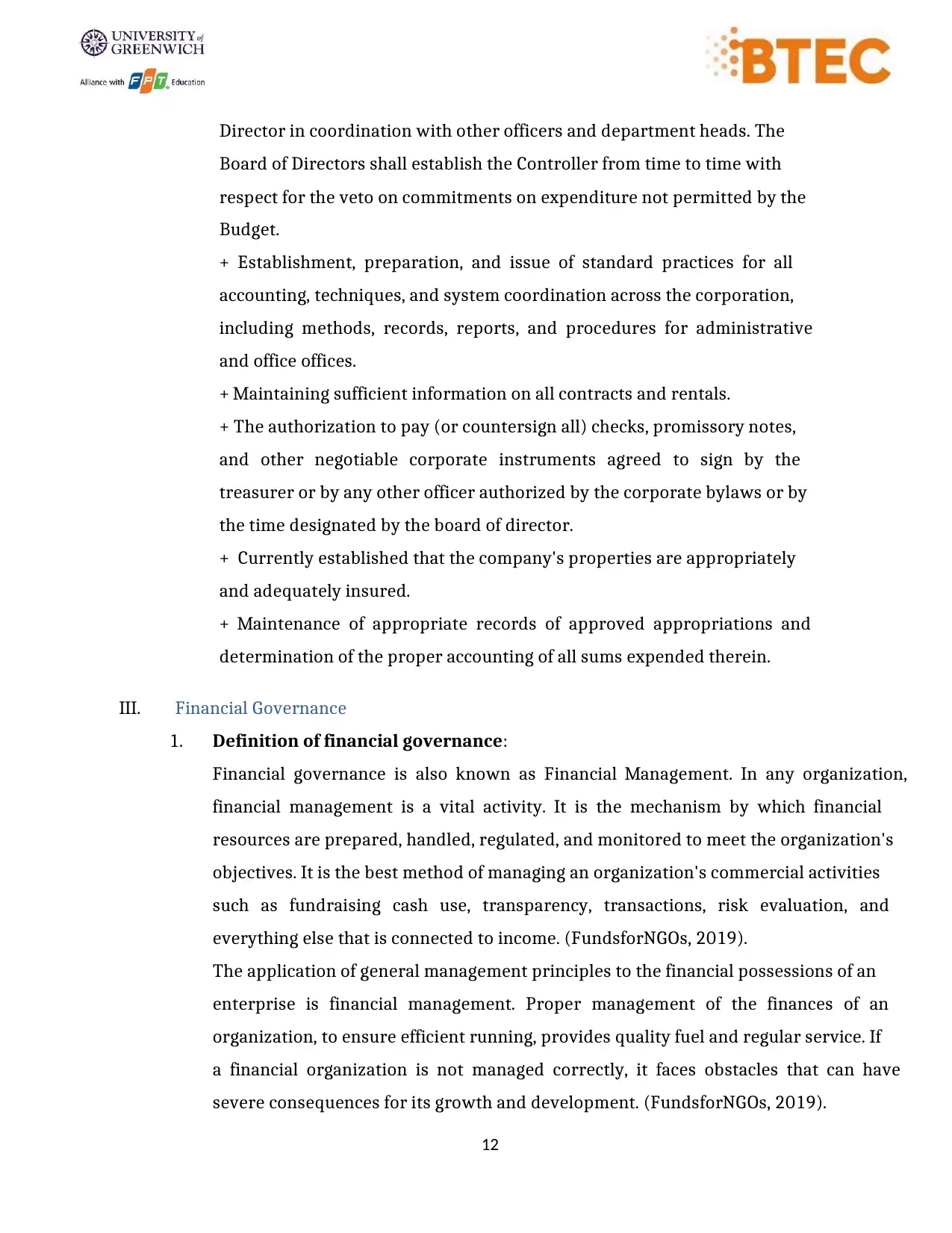
12
Director in coordination with other officers and department heads. The
Board of Directors shall establish the Controller from time to time with
respect for the veto on commitments on expenditure not permitted by the
Budget.
+ Establishment, preparation, and issue of standard practices for all
accounting, techniques, and system coordination across the corporation,
including methods, records, reports, and procedures for administrative
and office offices.
+ Maintaining sufficient information on all contracts and rentals.
+ The authorization to pay (or countersign all) checks, promissory notes,
and other negotiable corporate instruments agreed to sign by the
treasurer or by any other officer authorized by the corporate bylaws or by
the time designated by the board of director.
+ Currently established that the company's properties are appropriately
and adequately insured.
+ Maintenance of appropriate records of approved appropriations and
determination of the proper accounting of all sums expended therein.
III. Financial Governance
1. Definition of financial governance:
Financial governance is also known as Financial Management. In any organization,
financial management is a vital activity. It is the mechanism by which financial
resources are prepared, handled, regulated, and monitored to meet the organization's
objectives. It is the best method of managing an organization's commercial activities
such as fundraising cash use, transparency, transactions, risk evaluation, and
everything else that is connected to income. (FundsforNGOs, 2019).
The application of general management principles to the financial possessions of an
enterprise is financial management. Proper management of the finances of an
organization, to ensure efficient running, provides quality fuel and regular service. If
a financial organization is not managed correctly, it faces obstacles that can have
severe consequences for its growth and development. (FundsforNGOs, 2019).
Director in coordination with other officers and department heads. The
Board of Directors shall establish the Controller from time to time with
respect for the veto on commitments on expenditure not permitted by the
Budget.
+ Establishment, preparation, and issue of standard practices for all
accounting, techniques, and system coordination across the corporation,
including methods, records, reports, and procedures for administrative
and office offices.
+ Maintaining sufficient information on all contracts and rentals.
+ The authorization to pay (or countersign all) checks, promissory notes,
and other negotiable corporate instruments agreed to sign by the
treasurer or by any other officer authorized by the corporate bylaws or by
the time designated by the board of director.
+ Currently established that the company's properties are appropriately
and adequately insured.
+ Maintenance of appropriate records of approved appropriations and
determination of the proper accounting of all sums expended therein.
III. Financial Governance
1. Definition of financial governance:
Financial governance is also known as Financial Management. In any organization,
financial management is a vital activity. It is the mechanism by which financial
resources are prepared, handled, regulated, and monitored to meet the organization's
objectives. It is the best method of managing an organization's commercial activities
such as fundraising cash use, transparency, transactions, risk evaluation, and
everything else that is connected to income. (FundsforNGOs, 2019).
The application of general management principles to the financial possessions of an
enterprise is financial management. Proper management of the finances of an
organization, to ensure efficient running, provides quality fuel and regular service. If
a financial organization is not managed correctly, it faces obstacles that can have
severe consequences for its growth and development. (FundsforNGOs, 2019).
⊘ This is a preview!⊘
Do you want full access?
Subscribe today to unlock all pages.

Trusted by 1+ million students worldwide
1 out of 19
Related Documents
Your All-in-One AI-Powered Toolkit for Academic Success.
+13062052269
info@desklib.com
Available 24*7 on WhatsApp / Email
![[object Object]](/_next/static/media/star-bottom.7253800d.svg)
Unlock your academic potential
Copyright © 2020–2026 A2Z Services. All Rights Reserved. Developed and managed by ZUCOL.





